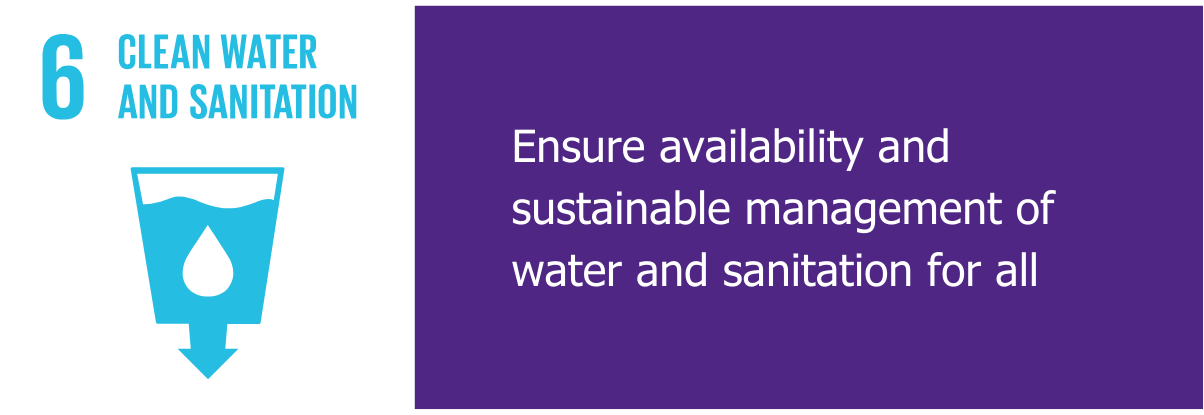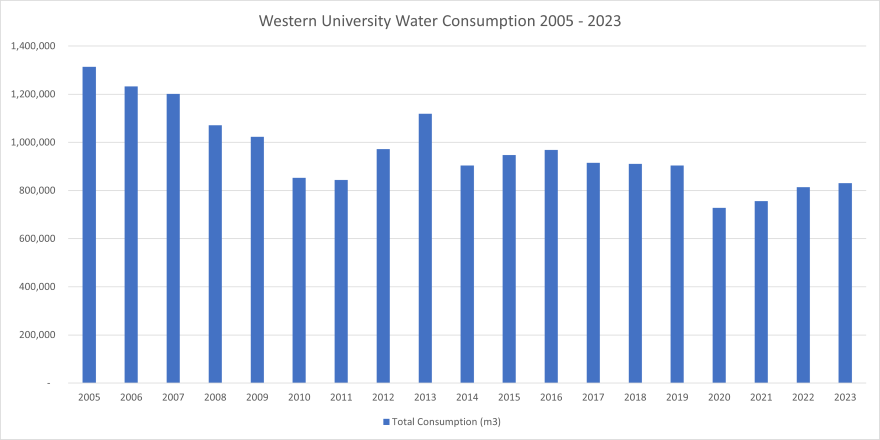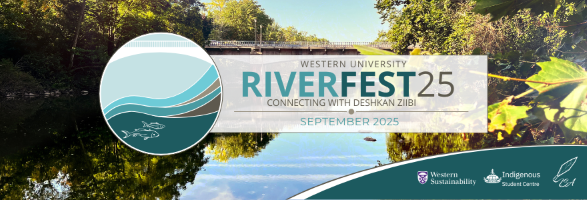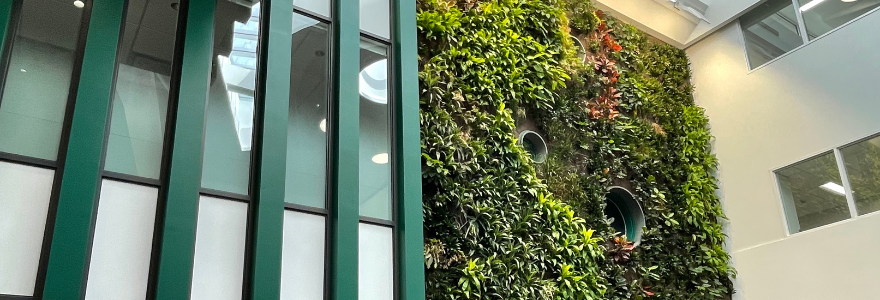SDG 6 - Strategic Initiatives
Wastewater Treatment 
Western University adheres to stringent water quality standards and discharge guidelines to protect ecosystems, wildlife, and human health.
Our wastewater is directed via the sanitary sewer system to the Greenway Wastewater Treatment Plant. This ensures compliance with the Ontario Water Management Quality Guidelines and the City of London’s Wastewater and Stormwater Bylaw. These guidelines are designed to safeguard all forms of aquatic life and their life cycles.
Western has implemented targeted measures to pre-treat greywater before it enters the utility’s sewer system, including the installation of sink grease traps in research laboratories. As a member of the Ontario Water Consortium, Western collaborates with the City of London to demonstrate and validate innovative, near-market wastewater treatment technologies. Western has partnered with the Government of Ontario on wastewater monitoring initiatives to enhance environmental protection and public health. The WesternWater Centre conducts research on water and wastewater treatment.
Marine and Water System Pollution 
Western University has processes in place to prevent and reduce marine pollution of all kinds, particularly from land-based activities. This includes processes to prevent polluted water from entering the water system, including pollution caused by accidents and incidents at the university.
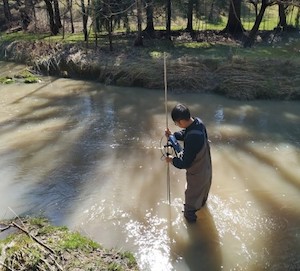 Western University abides by federal, provincial, and municipal regulations, as well as our own policies, to protect water resources and prevent marine pollution. The Canadian Environmental Protection Act regulates the disposal of wastes into bodies of water. The Ontario Water Resources Act regulates water quality and prohibits the discharge of pollutants into Ontario’s waters. London’s Water By-law (W-8) prohibits non-potable water from entering the water distribution system, and the Waste Discharge By-law (WM-16) regulates and enforces waste disposal into the public sewage systems.
Western University abides by federal, provincial, and municipal regulations, as well as our own policies, to protect water resources and prevent marine pollution. The Canadian Environmental Protection Act regulates the disposal of wastes into bodies of water. The Ontario Water Resources Act regulates water quality and prohibits the discharge of pollutants into Ontario’s waters. London’s Water By-law (W-8) prohibits non-potable water from entering the water distribution system, and the Waste Discharge By-law (WM-16) regulates and enforces waste disposal into the public sewage systems.
Western’s Policy on Environment and Sustainability commits to promoting sustainability as well as reducing waste and hazardous materials. Comprehensive procedures are in place to prevent polluted water from entering the water system, including: stringent protocols for handling and disposing of contaminated biowaste, emergency response plans for accidents, and regular safety audits to ensure compliance with environmental standards. Key policies include:
- Contaminated Biological Waste Disposal Policy
- Hazardous Chemical Waste Policy
- Hazardous Waste
- Laboratory Health and Safety Manual
Water Consumption and Reuse 
Western tracks campus water consumption. An official review of our Energy Conservation and Demand Management 2019-2024 Plan revealed that while space at Western increased by 6% from the 2018 benchmark, our water use was reduced by 9%, and our water use intensity was reduced by 14%.
Western reports water consumption through the AASHE Sustainability Tracking, Assessment & Rating System.
Western’s policy of water reuse includes the installation of 88 water meters that provide real-time data, annual testing of 651 backflow devices, and steam condensate recovery, saving over 230,000m3 of municipal water in 2024. The university also employs low-flow fixtures, low-irrigation landscaping, and cooling system improvements to further reduce water consumption. The multi-purpose greywater system alone has mitigated 10 million litres of municipal water since 2017.
Wastewater is directed to the Greenway Wastewater Treatment plant, and Low Impact Development systems, such as an on-campus rain garden, manage stormwater and support biodiversity. Additionally, Western has increased bottle filling stations and practices sustainable landscaping by reducing high-water requirement plantings and decommissioning irrigation systems.
Building projects follow the Sustainable Design Guidelines. Projects are designed to conserve and optimize potable water use for building and landscape, in accordance with Western’s water use performance goals. They aim to design for rainwater; condensate recovery; or stormwater capture, treatment, and reuse.
Western measures the steam condensate recovered from the central steam heating plant. In 2024, an estimated 230,381 m3 were recovered and reused.
Outreach: freshwater ecosystems, water management, overfishing
Western has several programs designed to educate and engage various audiences on the importance of water conservation, management, and overfishing for local and national community outreach, many of which are free.
- 100% Great Lake Fish Ontario Supply Chain Analysis:
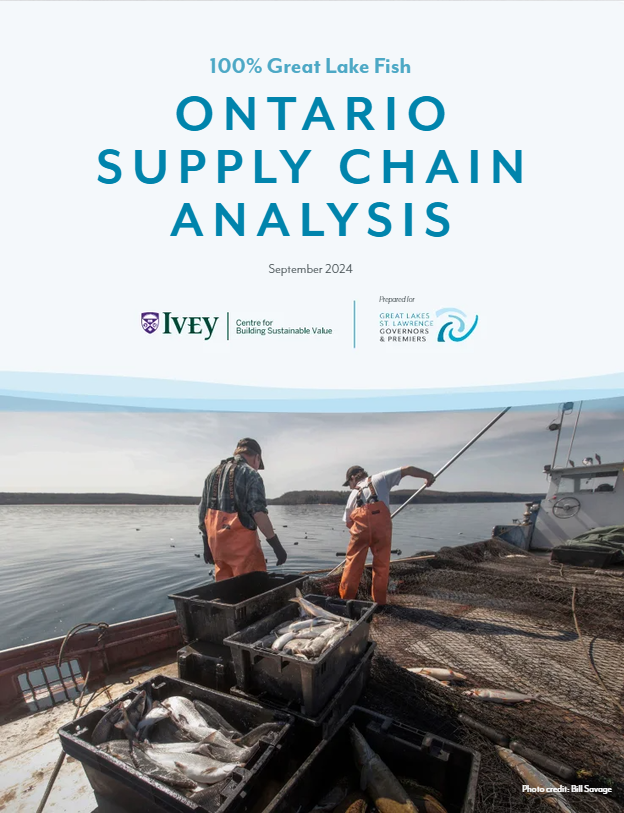 A free public report that offers insight into fish harvesting and processing in the Great Lakes region. The report explores options for enhancing economic and ecological performance for more sustainable fishing practices.
A free public report that offers insight into fish harvesting and processing in the Great Lakes region. The report explores options for enhancing economic and ecological performance for more sustainable fishing practices. - Biodiversity Inventory at Western University: All members of the community are invited to help gather data for informing future conservation and environmental research activities.
- A Brief History of the Great Lakes Lake Trout Collapse: Peter Baker shared his knowledge of the causes and impacts of overfishing by explaining the science in layman’s terms in a public magazine article.
- Central Canadian Symposium on Water Quality Research: Western hosted a conference to unite experts, researchers, NGOs, and stakeholders to tackle water quality issues. This event encouraged collaboration, knowledge sharing, and problem-solving, with attendees exploring the latest research and connecting with professionals and policymakers. Its interactive workshops provided strategies for improving and conserving water quality.
- Civil Engineering and AI Systems Engineering: Both programs have a Smart Cities and Environmental Engineering Option that specifically teaches Clean Water and Sanitation.
- Master of Environment and Sustainability Program: This program teaches about sustainability, the SDGs, marine ecosystem health, and watershed management.
- Riverfest: This is an annual event hosted by the Indigenous Students’ Association, Indigenous Student Centre, and Western Sustainability, and is free for the whole community. The festival events are centered around Indigenous perspectives on water management, viewing water as a living entity that requires respect, care, and a reciprocal relationship.
- SDG Month Canada: Western’s Centre for Research on Health Equity and Social Inclusion (CRHESI) hosted Life Below Water: A Virtual Dive Into Our Oceans, a free, public, virtual exploration of our oceans, featuring stunning imagery, expert insights, and discussions about marine conservation and sustainable ocean management.
- STEM@Home: Water Cycle in a Bag: This is a free kit for kindergarten to grade 2 students that lets participants create a mini water cycle model through hands-on experiments. Educational videos and activities highlight the importance of freshwater ecosystems. The program invites families, schools, and community groups to get involved, promoting informed choices about water conservation.
- WaterAid Western: This club engages students in discussions and activities related to clean water and sanitation issues, while raising awareness and funds on behalf of the organization WaterAid.
- Water Management Under Changing Climate: A workshop geared towards professional development for those engaged in climate change policymaking across all government levels.
- Western Centre for Animals on the Move: This centre hosts formal and informal events to share ideas, hold workshops, and brainstorm. Animal research includes Lake Trout, Smallmouth Bass, Chinook Salmon, as well as many other fish, birds, insects, and mammals.
- Western Water Chapter: Connects students with the water industry, through collaboration with Water Environment Association Ontario and the Ontario Water Works Association.
Water Extraction 
Western University receives its potable water from the City of London, which sources and treats water from Lake Huron and Lake Erie through the Lake Huron and Elgin Area Primary Water Supply Systems. Although treatment occurs off campus, these systems are operated under ISO 14001-certified Environmental Management Systems and are guided by Ontario’s Clean Water Act, 2006, ensuring that water extraction is sustainable and environmentally responsible.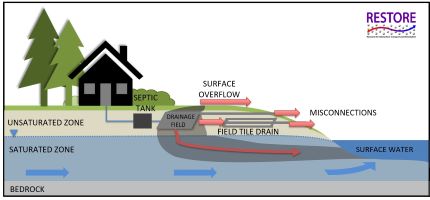
On campus, Western uses rainwater harvesting systems in select buildings to collect and reuse rainwater for irrigation and plumbing, representing a sustainable form of water extraction directly on university grounds.
The university also supports water conservation through infrastructure upgrades, real-time monitoring, and green infrastructure like rain gardens and permeable pavements.
Through RESTORE – Research for Subsurface Transport and Remediation, a research group focused on sustainable groundwater management, Western contributes to the development of innovative technologies and strategies for water conservation and contamination prevention.
Western University is committed to treating water as a valuable resource and continues to invest in sustainable practices both on and off campus.
Water Conservation 
Western makes practical contributions towards off-campus water conservation through partnerships and research that impact the local and regional communities.
- Global Leadership: An Ivey Business School course which engages students in experiential learning with local companies like Trojan Technologies, a global leader in clean water solutions. Through site visits and discussions, students explore how Trojan’s innovations—such as UV treatment systems for wastewater and drinking water—are applied worldwide.
- Ontario Water Consortium: Western is a member of this platform for industry, academia, government, and end-users, that connects leaders at the forefront of water innovation. Its mission is to enable a thriving community of the most ambitious and innovative partners. They advance technologies and science, and provide tools, policy, and knowledge exchange to address the economic, environmental, and social issues that stem from challenges in the urban water cycle.
- Research for Subsurface Transport and Remediation (RESTORE): Conducts innovative research aimed at addressing the sustainable management of our water resources through the development of engineering technologies in addition to enhancing understanding of natural hydrogeologic systems. Current research projects include:
- WesternWater Centre: WWC concentrates on research leading to innovative solutions addressing all aspects related to clean water supply and water-environment issues, including the protection and management of water resources, resource recovery, and treatment technologies. Learn more about our Water Resources theme.
Cooperation on Water Security
Western cooperates with local, regional, national, and global governments on water security.
- Addressing Forever Chemicals: Researchers at Western’s Institute for Chemicals and Fuels from Alternative Resources and collaborators from academia, government, and industry are identifying and treating ‘forever chemicals’ in water systems, an ever-increasing environmental concern, which affects more than 2.5 million Canadians.
- First Nations & Municipalities: Western studies regional relationships among First Nations and municipalities across Ontario to improve drinking water quality.
- Flushable Products: Barry Orr, sewer outreach and control inspector at the City of London, has worked with many groups of Western students amid a long-term effort to drive change with wipe manufacturers and international organizations.
- Global Leadership: Ivey partners with Trojan Technology on the environmental stewardship of water, primarily serving the municipal sector.
- Global Water Brigades: An international movement of university students working alongside local communities and technicians to implement clean water systems in the developing world.
- Global Water Futures Observatories (GWFO): Western partners with other Canadian universities, global networks, Indigenous communities, practitioners, policymakers, government, industry, conservation, and other sectors to develop capabilities, reduce risk, and safeguard water resources. GWFO provides open access water data to monitor changes in water sources, diagnose risks to water security, and design sustainable long-term solutions.
- Ontario Water Consortium: As a member, Western collaborates with federal and provincial governments to enhance water security through research, development, and the implementation of innovative water technologies.
- RESTORE: A research group that collaborates with government agencies to enhance water security through innovative research, advanced computer modeling, and the development of sustainable water management technologies.
- WesternWater Centre: A research group that collaborates with government organizations to develop innovative solutions for water security, focusing on clean water supply, resource recovery, and the protection and management of water resources.
 Promoting Water-Conscious Usage
Promoting Water-Conscious Usage
Western University has implemented several initiatives to promote water-conscious usage.
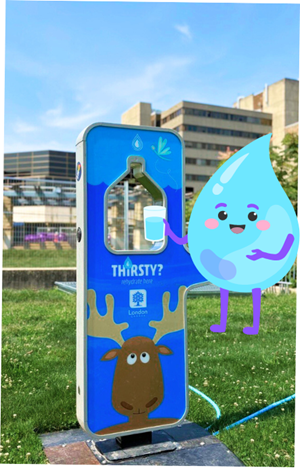 Annual Testing: Facilities Management tests 651 backflow devices annually to protect the drinking water from contamination.
Annual Testing: Facilities Management tests 651 backflow devices annually to protect the drinking water from contamination. - Dining Hall Initiatives: Programs like Meatless Mondays and the Choose2Reuse container system support water conservation by reducing the water footprint associated with food production and single-use packaging.
- Efficiency Upgrades: The university has installed low-flow fixtures, greywater management systems, and low-irrigation landscaping to reduce water consumption.
- EZ H2O Bottle Filling Stations: These stations are being installed and retrofitted to existing water fountains to encourage the use of reusable bottles.
- Greywater System: The power plant uses a multi-purpose greywater system, which has saved 10 million liters of municipal water since 2017.
- Refill. Rehydrate. Repeat.: This campaign encourages the use of reusable water bottles, and Western has stopped selling plastic bottled water across campus.
- Waterless Urinals: As part of a pilot project, waterless urinals have been installed in the Faculty of Education building, saving approximately 300,000 liters of water per year.
- Afternoon with the City of London: Hosted by the Western Water Chapter, this event welcomed City of London representatives to share insights on the city’s water system, treaty history, and current local water projects. By connecting students with municipal experts, the event fostered awareness of sustainable water practices and encouraged future careers in the water industry.
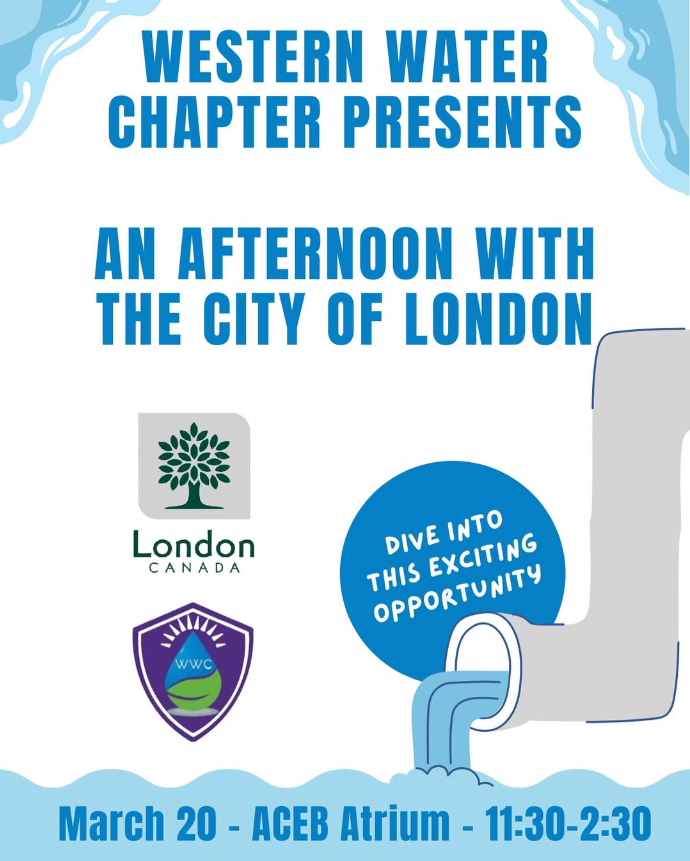
- International Conference on Flood Management: Western will host this international conference, bringing together global experts to share innovative strategies for flood resilience and sustainable water management. By fostering collaboration across disciplines and emphasizing community engagement, the conference promotes responsible water practices in response to climate change and increasing flood risks.
- RESTORE: Research for Subsurface Transport and Remediation combines state-of-the-art laboratories, field research, advanced computer modeling, commercialization with national and international collaborations, and strong industrial partnerships to address sustainable management of our water resources.
- Urban stormwater management project: This project improves understanding of pollutants in stormwater runoff to effectively plan and design stormwater management practices that will reduce the impact of runoff on ecosystems in London.
- SPARK Seminar Series: The Seminar Platform for Adaptive Resilience Knowledge is a monthly seminar series featuring global experts who share research and strategies on water resource management, climate change adaptation, and disaster resilience. By fostering dialogue and innovation, SPARK empowers students, professionals, and the public to engage with sustainable water practices and promote responsible water usage.
- Unclaim. Unsettle. Belong.: An exhibit at McIntosh Gallery explores the ecological restoration of the Coves neighbourhood, rivers, and ponds. Through land-based art and Indigenous perspectives, it encourages the community to reflect on sustainable water use and environmental resilience.
- WaterAid Western: A student-led club committed to building a community of passionate advocates for sustainable water, sanitation, and hygiene solutions. Through events, discussions, and fundraising initiatives, the club raises awareness about global water issues and supports the mission of WaterAid—a global non-profit working to ensure access to clean water, toilets, and hygiene for all through sustainable, community-driven approaches.
- Water Management Under Changing Climate: Hosted by Western Engineering’s Water Centre, this hands-on workshop led by Dr. Slobodan P. Simonovic brought together professionals to address the real-world impacts of climate change on water systems. Through systems-based approaches and interdisciplinary dialogue, the event promoted sustainable water management practices and equipped participants with tools to support climate-resilient decision-making in their communities.
- You And I Are Water Earth Fire Air Of Life And Death – PART 5 – Water (2024): An annual project taking place on 12 consecutive December 12ths, part 5 was hosted by Western’s artLAB Gallery. The immersive event explored our relationship with water through art, performance, and community reflection. Featuring the UpStream/DownStream presentation and a walk to Deshkan Ziibi (Thames River), the project raised awareness about clean water access and river health, encouraging deeper public engagement with water stewardship and sustainability.
These efforts reflect Western University’s commitment to sustainability and water conservation.
Free Drinking Water
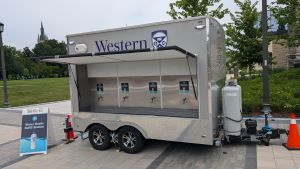
The municipal drinking water system in London, Ontario is comprehensive and well-regulated. It is regulated by the Safe Drinking Water Act, 2002. The City of London performs over 12,000 water quality tests annually to ensure the city water is always safe to drink. All of the tap water at Western University is connected to city water, meaning our tap water is free for all and always safe to drink.
Additionally, in an effort to reduce plastic pollution, Western has installed more than 200 water refill stations around campus which make filling re-usable bottles quick and easy. These are free and can be used by anyone who visits the campus.
Water-Conscious Building and Planting
Western is conscious of water use in building and planting decisions.
- Ecological Landscaping: Landscape Services consider native plants first in planting plans, and the right plant is selected for the right location.
- Invasive Species Management: Invasive species are not planted. They are controlled in some areas, replaced with native species is some cases, and cut down at the end of their natural life in others (e.g., Norway Maples).
- Raingardens: These have been installed in several locations. Consisting of a mix of native and non-native species that are pollinator-friendly and drought- and salt-tolerant, the rain gardens absorb excess water, reducing the runoff that would otherwise flow into the river and potentially lead to flooding.
- Sustainable Design Guidelines: These guidelines require new building projects to aim for LEED v4 Silver certification at minimum. LEED (Leadership in Energy and Environmental Design) water use standards include outdoor water use reduction, indoor water use reduction, building-level water metering, cooling tower water use, and additional water metering.
- Climate Change Adaptation: Projects must include strategies such as solar shading and rainwater harvesting.
- Richard Ivey Building: This building reduced potable water use by 58%, incorporated drought-resistant landscaping, and eliminated the need for a permanent irrigation system.
- Site Considerations: These guidelines shed light on requirements and best practices relating to landscape design and support multiple objectives of conserving potable water, managing stormwater on-site, minimizing the urban heat island effect, and erosion and sedimentation control requirements.
- Water Use: These guidelines consider design strategies that conserve potable water and reduce demand on all systems.
- Western’s Open Space Strategy: This strategy includes a section on planting design guidelines, which prioritize water and drought-resistant plants, as well as low-maintenance plants.
